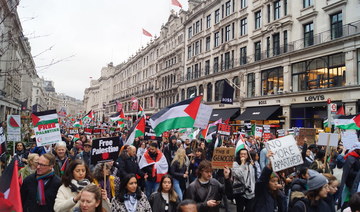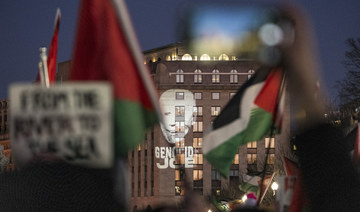TAIPEI: Taiwanese activist Aurora Chang is no stranger to online hate from abroad, but her support for the Palestinian cause amid Israel’s war on Gaza has seen the 24-year-old face a new wave of abuse and threats from her compatriots.
Born and living in Taiwan, Chang has been involved in various movements, from the International Tibet Network to Taiwan Stands With Ukraine, and most recently, For Peace Taiwan, a group that was created when Israel launched its onslaught in October last year.
“Doing this work, actually, has been really emotionally taxing for me. I’m used to getting hate from Western communists who are pro-China and pro-Russia. I’m used to that,” Chang told Arab News.
“This time, with the Palestinian stuff, that is coming from inside. It’s coming from Taiwanese people. I’ve gotten death threats and very unpleasant messages because of the things I’ve been posting about Palestine.”
The Taiwanese government largely expresses support for Israel, which, since the beginning of its bombardment of Gaza, has organized public diplomacy campaigns to the country, capitalizing on China’s opposition to the war and the existential threat Taipei sees in Beijing.
About one-third of the Taiwanese public have uncritically accepted the Israeli narrative about the war, according to a poll published by the Taiwan Public Opinion Foundation in late October, as Israel is backed by the US and Washington acts as Taiwan’s key ally.
But for Chang and her friends, the arrangement of alliances makes little sense. Based on her nation’s experience, she would rather draw parallels and sympathy with Palestine, not Israel.
“There’s no logical and moral consistency in supporting Taiwanese independence when (you are) not supporting Palestinian liberation and independence,” she said.
At the same time as Palestinians have been subjected to decades of Israeli occupation, the self-governing island of Taiwan has faced military threats from the People’s Republic of China, which has laid claim to its territory for decades.
For Peace Taiwan was established to amplify Palestinian voices and counter Israel’s domination of mainstream public opinion in the country.
The collective of about 20 young volunteers shares pro-Palestinian content on social media, translated into the Mandarin language, holds rallies and discussions, and liaises with Taiwanese media companies to encourage greater coverage of Israel’s actions in Gaza.
“What we really need is Palestinian perspectives, so that it’s easier for people to empathize when there are personal stories and faces attached to larger political issues. Hopefully, little by little, we can make a difference,” Chang said.

Residents of Taipei take part in a Palestine solidarity demonstration organized by For Peace Taiwan. (Supplied)
Though the TPOF survey revealed that fewer than 15 percent of Taiwanese people support Palestine, the poll also showed that about 34 percent had no opinion.
For Peace Taiwan wants to tap into the undecided segment of the Taiwanese public.
“What we are trying to do is to reach the people who have no idea or no opinion over this issue, because this has been a catastrophe that has been going on for over 75 years,” said Pin-Tsun Huang, another For Peace Taiwan volunteer.
“How can you care if you don’t know? We want to make people aware of this issue and let them know how they can help; how they can use their voice.”
Like Chang, Huang also sees the Palestinian struggle, to some extent, as mirroring Taiwan’s own.
“One of the biggest things we have in common with Palestine is that we are a silenced nation. We don’t have a voice on the international stage because Israel controls the voice of the Palestinian people, whereas China controls the voice of the Taiwanese people,” Huang said.
“You can also argue that Taiwan is a lot more like Palestine in that we are facing oppression from an extremely strong militant nation next to us. And we are denied self-determination by them.”
The key reason to counter the mainstream narrative, however, is more than matter of identity for the group.
“It doesn’t matter what our nationality is,” Huang said. “All we have to be is human to recognize that there’s a genocide — and that we should all demand a ceasefire and an end to oppression, and settler colonialism.”
And that should not be difficult for Taiwanese society, but it requires a shift in media coverage, which, since the beginning of the conflict, has reflexively sided with Israel, according to Brian Hioe, founding editor of New Bloom, an online magazine covering activism and youth politics in Taiwan.
“New Bloom sought to inform the public about Palestine, to hopefully lead to further consideration of places where Taiwan and Palestine share certain similarities or parallels,” he said.
“It is a cause that we feel deserves more attention, and as part of where we stand in Taiwanese society, we hope to push for a shift in social views on the situation.
“This is no different than us standing in solidarity with Hong Kong, Ukraine or elsewhere.”
























